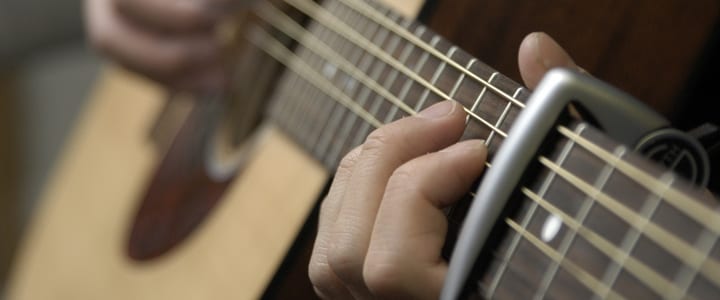So you’ve memorized the basic major and minor chords, and learned a few easy guitar songs. What’s next? Check out what a capo can do for you in this guest post by Perth Amboy, NJ teacher Jeff S...
In case you’re unfamiliar with a capo, they’re those metal devices that clip onto the neck of a guitar, as you see in the photo above. If you’re a guitarist and you don’t own a capo yet, but are curious about them, my hope is that you’ll want to get one after reading this article. And for guitarists who already own a capo but haven’t fully exploited its potential, this article should tweak your interest.
What Exactly Can a Capo Do For Me?
Capos come in incredibly handy in instantly providing a one-step solution to play along with songs written and sung in keys “unfriendly” to guitar (such as Ab, Bb, Eb, Cm, Fm, etc.). For instance, if you wanted to play Adele’s “Rollin’ In The Deep” on guitar so that it matches up with the recording, all you’d have to do is put the capo at the 3rd fret and play Am, E, G, and F chords (that you likely already know in 1st position).
Simple, huh? There are countless other songs you can use capos for to play on guitar, even if they weren’t written on guitar or if there’s no guitar in the recording. All you need is basic guitar chord knowledge.
How Does It Affect the Sound?
Depending on how far down the neck the capo needs to be placed to match up with the key of a song, it can either subtly or drastically alter the “personality” of them. The results will vary from song to song, but capos will immediately render new tonal “colors,” increasing the brightness and making your playing and songwriting more diverse and engaging.
If you want to hear some amazing examples of how magical songs can sound with capos, listen to the Beatles’ classic “Here Comes The Sun”, written by the late great George Harrison. The capo is on the 7th fret, which creates a feeling of optimism and sparkle that would be completely missing without the capo. The use of the capo has increased exponentially since then and just about every artist (or their guitarist) has one and uses it extensively. Check out the incredibly mood-inducing and engaging capoed guitar on Passenger’s “Let Her Go” and the guitar work on Taylor Swift’s “Safe And Sound”, for example. If you’re still in doubt about the power of the capo, try playing those songs without the capo and listen to the difference.
What If I’m Not Super-Knowledgeable About Keys and Chord Names?
You can effectively integrate the capo into your playing even if you know little to nothing about music theory and don’t know too many chord names. Let me illustrate: say you want to create a higher-pitched G chord. Just clamp your capo on the 5th fret and play a conventional D chord form (see chart below) and you will instantly hear it in a crisp and refreshing new way.
Next, let’s say you want to brighten up the otherwise deep and dull E chord in first position. Just clamp your capo on the 7th fret and play a standard (1st position) version of an A chord (again, see chart). Voila! You’ve instantly brightened the previously low-end E chord. Play that while your jam partner or singer plays the conventional E chord and you’ve got a very rich tonally-diverse sound. Familiarize yourself with all the capoed versions of the major and minor chords in the chart and soon you’ll be thanking the capo gods every night.
Is There an Easy Way to Get Started With My Capo?
You bet! I suggest you pick out two or three of your favorite guitar songs that you’re really comfortable with and can almost play blindfolded. Then use the chart below to find different places further down the neck to play the chords that you’ve been playing in 1st position.
 Try several voicings of the chords until you find one you’re drawn to. Relearn the song using a capo and these new chord shapes. Just doing this will widen your tonal range on the guitar without you having to play (much more challenging) barre chords, and it will also add a new chordal dimension to your playing. And the added benefit is that these new capoed versions of your favorite songs will make your future jams much more interesting. All you really need to get started on your capo adventure is a little time, an open mind, and (of course) a capo!
Try several voicings of the chords until you find one you’re drawn to. Relearn the song using a capo and these new chord shapes. Just doing this will widen your tonal range on the guitar without you having to play (much more challenging) barre chords, and it will also add a new chordal dimension to your playing. And the added benefit is that these new capoed versions of your favorite songs will make your future jams much more interesting. All you really need to get started on your capo adventure is a little time, an open mind, and (of course) a capo!
 Jeff S. teaches guitar, ukulele, speaking voice, songwriting, and more in Perth Amboy, NJ, as well as online. Jeff has created and taught songwriting and music business classes at colleges, universities, and music schools throughout the country for many years. Learn more about Jeff here!
Jeff S. teaches guitar, ukulele, speaking voice, songwriting, and more in Perth Amboy, NJ, as well as online. Jeff has created and taught songwriting and music business classes at colleges, universities, and music schools throughout the country for many years. Learn more about Jeff here!
Photo by James Kim
Suzy S.


